Lea Wait's Blog, page 259
June 3, 2016
Weekend Update: June 4-5, 2016
 Next week at Maine Crime Writers there will be posts by Kaitlyn Dunnett/Kathy Lynn Emerson (Monday), Dorothy Cannell (Tuesday), John Clark (Wednesday), Brenda Buchanan (Thursday), and Susan Vaughan (Friday).
Next week at Maine Crime Writers there will be posts by Kaitlyn Dunnett/Kathy Lynn Emerson (Monday), Dorothy Cannell (Tuesday), John Clark (Wednesday), Brenda Buchanan (Thursday), and Susan Vaughan (Friday).
In the news department, here’s what’s happening with some of us who blog regularly at Maine Crime Writers:
Lea Wait: Busy week! Saturday, June 4, Dorothy Cannell and I and children’s author Melissa Sweet will be signing our books at the Waldoboro Library, Waldoboro, Maine, from 12:30 until 3:30, helping the library celebrate it’s 100th anniversary. There’ll also be music, face painting, games, refreshments … and a good time for all!
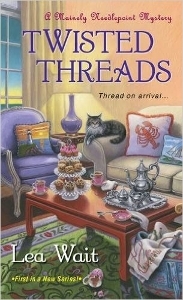 Thursday, June 2, I’ll be speaking with the Mystery Group at White Birch Books in North Conway, New Hampshire about my TWISTED THREADS. In the area? All are welcome.
Thursday, June 2, I’ll be speaking with the Mystery Group at White Birch Books in North Conway, New Hampshire about my TWISTED THREADS. In the area? All are welcome.
Friday, June 3, from 5 p.m. until 7 p.m. my husband and I will be at the opening of the Stable Gallery on Water Street in Damariscotta. His paintings will be featured.
Saturday, June 11, I’ll be at the Guilford Library in Gulford, Maine, from 11 a.m. until 1 p.m., signing my books and chatting informally about mysteries. Stop in if you’re in the area!
An invitation to readers of this blog: Do you have news relating to Maine, Crime, or Writing? We’d love to hear from you. Just comment below to share.
And a reminder: If your library, school, or organization is looking for a speaker, we are often available to talk about the writing process, research, where we get our ideas, and other mysteries of the business. Contact Kate Flora: mailto: kateflora@gmail.com
June 2, 2016
A Ladder for Maine Fish? It’s Alewife Time!

Priscilla McCandless’ painting of the fish ladder and the small community of Damariscotta Mills
Lea Wait here, betting that a lot of you have never heard of either fish ladders or alewives. So – here’s the story. An alewife is a small (8-10 inch long) fish. This time of year, the alewives head up some of the rivers in Maine to spawn.
The Damariscotta River (Damariscotta means “river of many fishes) is one of their ancestral routes. Thousands of alewives swim up the river from the sea, and jump up the falls at Damariscotta Mills to get to the fresh water of Damariscotta Lake. For hundreds of years their annual migration has provided food for gulls, ospreys — and humans living nearby, who dried and salted the little fish. The smallest fish were also used as lobster bait.

Alewives, Heading Up the Falls
But as far back as 1730, humans blocked the migration by constructing a double sawmill on the falls. In 1741 the Massachusetts Legislature (Maine was then a district of Massachusetts) passed an “Act To Prevent the Destruction of Alewives and Other Fish”,
requiring that passage for fish be provided around falls blocked by mills.
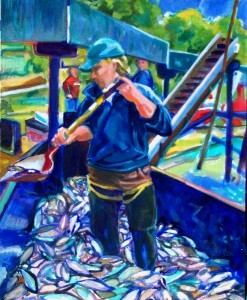
Priscilla McCandless painting – Harvesting Alewives in the old days
In Damariscotta Mills the fall are 42 feet high. At first a local shipowner had his

A view of the Fish Ladder
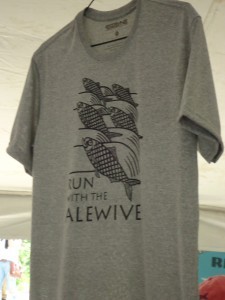
Buy a tee-shirt! Save the alewives!
employees net as many of the thousands of fish as possible and carry them to the lake above the falls. That plan proved ineffectual, at best.
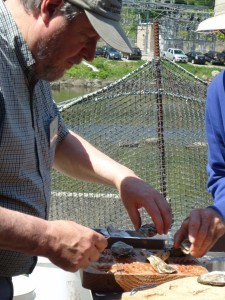
Stephen — he and others shucked over 2,000 oysters during the Festival!ohen
In 1809 the towns of Newcastle and Nobleboro built a lock stream to help the fish climb the falls; it had to be rebuilt every five to ten years.
In 2007 the Fish Committee of Nobleboro and Newcastle initiated a major building project: the construction of a permanent, stone, environmentally safe and attractive “ladder” for the fish. Every year since, over Memorial Day weekend, they sponsor a festival to raise the funds to do this. And every year the “Fish Ladder Restoration Festival” — known locally as the “Alewives Festival” — has gotten larger and raised more money. People from all over the United States have made the Festival (and the sight of thousands of fish heading up the falls) a destination.
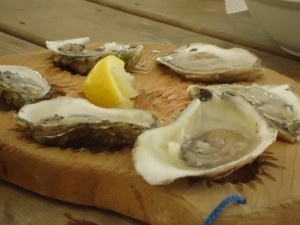
Yum! Local oysters!
This year 5 and 10 K runs were added to sales of tee-shirts and hats, food (oysters, beer, lobster and crab rolls, hot dogs, and a pig roast), rides in antique cars and horse-drawn wagons, live music, and, of course, the stars of the show: the alewives. The festival hosted thousands of guests, and raised about $30,000 to contribute to

Waiting Herring gulls, between fish courses
the Fish Ladder Restoration.
My husband and I participated, as we have several other years. Our friends Priscilla McCandless and Stephen Vowles, who live in Damariscotta Mills, are very active in the Festival, as are our Edgecomb neighbors who own Alewives Fabrics, a store near the falls.
You may have missed attending the Festival this year … but the pictures here should give you an idea of how much fun it was! Bob and I devoured oysters and hot dogs, and bought pork sandwiches home to eat for dinner. Yum! Local gulls and ospreys thought the same …
And, best of all, the alewives are, once again, back.
Lea Wait writes the Shadows Antique Print Mystery series and the Mainely Needlepoint series, and five historical novels set in nineteenth century Maine. She’s a fan of all things fish.
Maine’s beautiful, tragic reality: The enemy is us
A summer or two ago, I was standing in line for some food in my small central Maine town when a tourist – I’m not making assumptions, sometimes you can just tell – asked me where she could find a public bathroom. I suggested the porta-potty at the local country store, or the one at the other end of Main Street by the church parking lot.
She was appalled and maybe even a little disgusted. And kind of disdainful.
Sorry, lady. Maine.
When you live here, you learn to accept the lack of facilities, lack of cell service (there are even places in my house I can’t get it), issues related to remoteness – like no open restaurants or bars, or even lack of food or gas stations if you go too far off the track. There’s a hope that if people come up to take advantage of the beauty our state has to offer and stray away from the lobsters and lighthouses, they’ll know that too and be prepared.
As Dylan sang, “If you don’t believe there’s a price for this sweet paradise, just remind me to show you the scars.” He wasn’t singing about Maine, but you get the picture. Nothing this good doesn’t come with some hurt.
Most times, the result is that people who misjudge just how remote or rustic things are in Maine are inconvenienced.
But sometimes it’s worse.
That hit home last week when the Maine Warden Service released it’s 1,500-page sad and tragic report on the disappearance of Geraldine Largay. Largay, 66, disappeared on the Appalachian Trail in western Maine in July 2013. Her remains were found in October 2015, about two miles off the trail in a restricted military area. At the time, the warden service didn’t say much about the circumstances and the focus was on how sad and tragic it was that in one of the most extensive searches in the state’s history, one that had gone on in various forms until she was found by someone who wasn’t looking for her at all, she succumbed to hunger and thirst and died waiting for someone to find her.

Geraldine Largay, seen here the day before she became lost, disappeared off the Appalachian Trail in July 2013. Her remains were found in October 2015 and the Maine Warden Service case file was released last week. (contributed photo)
The report is even more – here are those words again – sad and tragic. As the media, including the newspaper I’m city editor of, the Morning Sentinel, started digging through the case file, the details were sobering. She’d wandered off the trail July 21, 2013, about three hours after texting her husband, who was meeting her two days later where the trail crossed Route 27. When she realized she was lost, she texted him again saying she was lost and asking for help, but he never got it because there was no cell service where she was. She tried again, many times, but none of those texts reached him.
Largay kept a journal with a final entry Aug. 6 asking that her family be notified when her body was found, and a possibly later entry, though the warden service says that date is in question.
As we looked further into the case file at the Morning Sentinel, the tragedy became even more chilling. Buried in all that other information was the fact that Largay didn’t know how to use a compass.
Largay, of Tennessee, had started hiking the second half of the trail in Harpers Ferry, West Virginia. She’d gone about 950 miles and had less than 200 to go. A friend had accompanied her, but had to leave as they finished the trail in New Hampshire. And Largay was alone.
When she was lost, again when her remains were found and again after the news from the report began making headlines last week, the warden service and her family said she was an experienced hiker. But her friend, in the report, also said she had increasingly become more disoriented on the trail and was prone to panic. She didn’t like being alone and didn’t like the dark. She’d been prescribed anti-anxiety medication, but no one knew if she’d been carrying with her or was able to renew the prescription.
She’d had a SPOT device – a GPS that can be used instead of a compass – but according to the report had left it behind in a hotel. She had a compass, but according to the report, didn’t know how to use it.
Her husband was meeting her at checkpoints every few days and they were relying on texting to keep in touch.

The Appalachian Trail near it’s end at Mount Katahdin in Baxter State Park. Geraldine Largay was less than 200 miles from her destination when she became lost.
Yes, Largay was experienced – she’d hiked hundreds of miles on the Appalachian Trail, had taken a course before her hike, had hiked before. But she was entering what’s considered the most challenging part of the trail. A place she couldn’t expect to get cell service. A place where the woods can eat up a person in minutes. A place where some of the most experienced searchers in the world couldn’t find her, despite coming as close as 100 yards of her resting place with a dog tracking team.
She was alone. She was prone to getting disoriented. She didn’t know how to use a compass.
The Morning Sentinel has written numerous stories, including the ones on Largay, where locals stress how many underestimate Maine – its remoteness, its wildness. Many of the conveniences we rely on in other places just don’t work or help here.
There’s a kind of joke among Maine mystery writers that despite the fact the state has one of the lowest crime rates in the country – we get about 20 to 25 homicides a year – we certainly kill off a lot of people in our books. I was just thinking about that yesterday, as we reported on the state’s sixth homicide of the year, a fatal shooting in Wilton, also in Franklin County south of where Largay got lost. I think between Cold Hard News and its soon-to-be released sequel, No News is Bad News, I’ve killed off that many people in less than a year. In one town with a population of about 2,000.
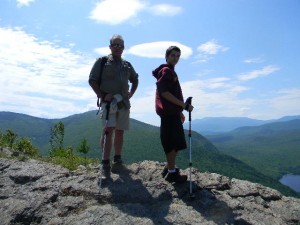
My brother Bill and nephew Tim hiking in Baxter State Park. Maine is beautiful, but unforgiving. It’s up to us to know that.
What we forget is that the biggest threat to life in Maine is Maine itself. This doesn’t mean the state and its wilderness is evil or bad – English and philosophy majors will recall the school of Naturalism, the belief that nature is in charge and what it says goes. Free will? It’s a joke. We have no control. It’s indifferent to puny humans and we think we can conquer it at our own risk. At least that’s how I remember it. Writers including Edith Wharton, John Steinbeck and Stephen Crane were big believers. One of the biggest was the great Jack London, whose “To Build a Fire” is Largayesque in its tragedy.
None of this is a knock on Geraldine Largay or her family or the warden service.
But please remember this if you’re going for a day hike, even in the lobster and lighthouse district, or out in the wilderness, in Maine, or anywhere:
She got off the trail and became disoriented. She didn’t know how to use a compass. Her cellphone didn’t work.
The people most qualified to find her couldn’t as she lay dying from lack of food and water in her tent about two miles off the trail in Franklin County, Maine.
——-
Maureen will be one of the featured authors at Maine Author Day at the Guilford, Maine, Memorial Library, 11 a.m. to 1 p.m., Saturday, June 11. Come on by and say hi! Books will be available for sale and signing.
——-
Maureen Milliken is the author of the Bernie O’Dea mystery series and city editor of the Morning Sentinel in Waterville, Maine. Follow her on Twitter: @mmmilliken47, on Facebook: Maureen Milliken mysteries, and sign up for web updates or find out about her latest book at maureenmilliken.com.
May 31, 2016
Keeping a Series Character Alive
I recently came across a tweet from Lawrence Block praising John Sandford’s most recent release in the Prey series, a fine police procedural set in and around Minneapolis. With my usual grace for social media, I’ve lost the tweet itself but the essence of Block’s praise was his sense that Extreme Prey (the 26th in the series!)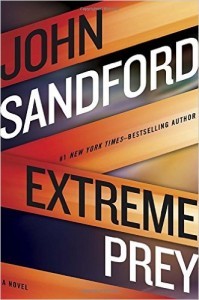 continues to draw and entertain new readers because of the way Sandford has developed and extended his protagonist over that time.
continues to draw and entertain new readers because of the way Sandford has developed and extended his protagonist over that time.
Lucas Davenport might be one of the most fully-realized series character in contemporary crime fiction. His professional roles through the course of the Prey books alone would be enough to ensure a level of interest. He’s been a patrolman, a detective, then a deputy chief with the Minneapolis police department, fired from all of those positions, rehired into vague investigatory slots. He’s been a civilian contractor with the New York PD and the chief of the Minnesota Bureau of Criminal Apprehension. Between jobs, he winds up in barely-defined political troubleshooting roles for various local and national politicians, including the governor of Minnesota. On top of that, he’s been a game designer, a businessman, and he’s rich enough that he doesn’t even have to work. Or take any crap from the bureaucracy.
The chief challenge for a crime writer creating a series character is keeping him or her fresh and interesting over multiple books, revealing enough to engage the reader without overdoing the backstory and overwhelming the reader, who is reading your book for the story too. Consider your own favorite series character who’s survived 5 or 6 books and I’m sure you can point to examples where the character gets—well, if not boring, a touch predictable. 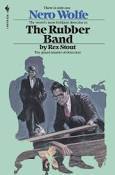 After a while, Nero Wolfe’s orchids and beer consumption become less about the character than a convenient shorthand for him, a kind of template.
After a while, Nero Wolfe’s orchids and beer consumption become less about the character than a convenient shorthand for him, a kind of template.
The temptation for a writer (because we writers always have to make ourselves do the hard things) is to let the markers stand in for the characters, instead of developing the character more deeply. I see this in some of the late Parker-written Spenser novels—Spenser’s modes, attitudes, solutions, and repartee haven’t moved all that far from those in The Godwulf Manuscript, the very first in the series.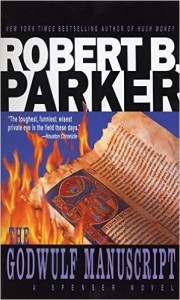
As a writer interested in a long and happy life for Elder Darrow, the protagonist in
Solo Act, I’m always trying to figure out what makes a protagonist so interesting that I will even go back and read books I know, just to spend time with the character. I just read Extreme Prey myself and while Lucas Davenport is recognizable both physically and psychologically, he has not staled. Here are some of the reason why:
He owns a rich and varied backstory, starting from the very first book, including stories about childhood friends like Elle Krueger (who appear later as a significant character), about his college hockey-playing days, his roots, and his history with the city of Minneapolis. As the series progresses, the backstory grows to include lovers, an out-of-wedlock child, a near-feral girl whom he rescues and winds up taking as a ward; and Weather, his now-wife, who in an early book saves his life with an emergency tracheotomy. Various partners, friends, and thugs come and go. But the backstory is only presented in places where the story requires it. Sandford does a fine job making these events and people appear naturally over course of the series, as they would be over a life.
Davenport also carries a set of characteristics, physical and psychological, that both identify him and challenge him in every book. He has his scars, of course, but he has a propensity for violence, for rage, a certain vanity about his clothes, an inability to get along with any form of command structure for long. But these are not markers, not only descriptive bits. They work with the plot and Davenport’s character, sometimes to his benefit, sometimes not. They are characteristics, not identifiers.
What makes him believable for me, then, is the full sense of a life lived, as it is being lived. What is front story in one book becomes back story in the next, adding layers of complexity and humanity to the character. His attitudes change—he becomes more politically savvy, spends less time indulging his lustful eye. Friends and colleagues change, get sick, die.
All this suggest something I’ve heard a lot as a writer but maybe never internalized as much as I need to. When you first create a character, especially a series character, you need to know him or her as well as yourself. Before you write the first book you need to know as much as you can. Much of what you know will never appear on the pages but the knowledge will inform the character as you tell his or her story and affect how the plot works with and on the character. And, of course, if you are lucky enough to create and maintain that deep relationship, you may even create a character that endures. Sherlock, anyone? Miss Marple? Travis McGee?
A Mostly True, Sorta Tale of Guyishness, Minus the Bullet Holes and Duct Tape
John Clark is unavailable today as he’s in Rapid City, SD at the Elmo Ermwood Institute for an annual spiritual oil change and alignment. He will return for his next regularly scheduled post. His favorite cousin, Pradesh ‘Bubba’ Letourneau is posting instead about John’s history with “Guy” mishaps.
I was sittin’ on the back porch swing when John stumbled around the corner, wincing visibly as his tailbone met the seat beside me. “Need a refresher, Boy?”
He nodded.
“The usual?”
“Yup.”
When I returned and handed him a can of diet cherry soda, he mumbled thanks, popped the top and killed half in one continuous gulp. “Thanks, I needed that. I been dragging so much the past couple weeks, I gotta stop and pull dandelions outta by backside before Ma will let me in the house.”

Some stuff got done despite the log attack, like the grapevine revamp.
“Don’t tell me. You gone back to doin’ them dumb guy things again. I thought you outgrew them ’bout twenty years ago.”
“So did I, but when you’re a writer, sometimes you gotta experiment to get a handle on realism, ya know.”
“Do tell. Lemme see, then. Does that mean the Roto-Rooter man’s gotta go sewer pipe divin’ if he wants to get real good at his job?”
John winced. “Don’t make me laugh, that hurts almost as bad as sneezing right now. How else was I gonna learn that duct tape ain’t worth a damn when it comes to fixing bullet holes, but sterile tent caterpillar silk and super glue work slick as a smelt.”

We have plenty of extra Hosta as well as Calendulas, if anyone is interested.
“Cripes, Bubby, you didn’t shoot yourself just to see how it felt did you? I could see doin’ some serious experimenting if you was writin’ them bodice rippers, but hands-on mayhem don’t seem particularly appealin’ to me.” Besides I’d think you’d have enough hands and body-on experience already to rely on.
“Lemme see, there’s the broken foot when you got it caught in the spokes on your bike, the near ruptured appendix and that sadistic nurse who came in every twenty minutes to make you laugh, the cat that darn near scratched your eye out, the tree ya dropped on the power line, the chip ya took in your eye when you was too stubborn to wear safety goggles.”
“You can stop any time now.” John was fighting a grin as I reeled off his lifetime of mishaps.
“Ain’t happening. I’m just getting’ to the good stuff like runnin’ into that elm tree on a borrowed motorcycle, then compounding injury and insult by showering with the cast still setting AND then trying to use a scythe to cut brush the next day up on Appleton Ridge. How about the cigarette that burned your finger down to the bone on our class trip? Dare I mention drivin’ your dinky station wagoninto Chickawaukee Lake while blitzed? I’ll grant that ya slowed down after coming to your senses, but there’s a couple real good chainsaw bites like the one on your kneecap and the time you tried bucksawin’ and talking at the same time. I bet that scar’s still visible unlike the stitches ya popped when tryin’ to plant trees the day after hernia surgery.”
My cousin had the grace to blush when I paused. Truth be told, if he wanted to, John coulda come up with almost as many guy-haps on my part if he wanted to. I decided I’d better finish the list quick. “Lemme see, what did I forget? Oh, yeah, the finger. Come to think of it, that might have been the best and last one I remember. It takes a real idiot to drop a three hundred pound rock on their pinkie, split it to the first joint and try to convince their RN wife that a bandage was gonna do the trick. How many stitches did it take?” I was rewarded by a two middle finger salute.
“So, Bubby, what happened this time?” I waited while John killed the rest of his soda.
“Well, a couple weeks ago, I got real ambitious about pruning apple trees, seeing as how I’m retired and have time to really get on top of projects. Since that damn ethanol dissolved the fuel line in my chainsaw and I sorta haven’t gotten around to hauling it up to Harmony to get it fixed, I used my hand pruning saw to do the job. However, that left some hellaciously big limbs to buck up and doing so with the pruning saw gets old real quick, so one Sunday I strung all my extension cords together and started cutting the four big limbs into stuff that Sara and Russ can burn in their stove. I was using my electric pruning saw which, by the way is one of my best buys ever. The biggest limb was Y-shaped and about 12 feet long. I’d just sawed through a chunk that was about head high, when the rest of it jumped forward. The cut end smacked me square in the chest and I swear, I knew how Sonny Liston must have felt when Cassius Clay hit him in the Lewiston Fight. It was instant numbness, followed by the thought that maybe my heart might stop and then serious hurt. Of course real guys don’t stop to assess damage, they finish the job, so I kept cutting, then stacked everything before daring to lift my t-shirt and see how bad it was. Sure enough, there was a big red half circle of ugly and lots of unhappy ribs.

Put ’em together and whatta ya got? A real rib killer.
“That was what led to my dragging. Still doing so and my ribs aren’t in a very forgiving mood.” John gave me a pained grin. “That stuff about the duct tape, bullet hole and caterpillar silk packing was all thrown in for effect, but I bet I could do a half decent job of using them in a story down the road.”
May 30, 2016
Letters from the Civil War
Hi. Barb here.
When I realized my posting day was Memorial Day, I was a bit flummoxed. There are several people here on the blog who are better equipped to remark on this day than I am.
My father served in Korea, and my grandfather in World War I, and preparing to write this post sent me on a mad scramble to find a photo of either of them in uniform. I didn’t find any, and neither of them were the type to speak about their service. (And since my grandfather was a stockbroker, which meant he made his living on the phone, which meant he would talk your ear off about pretty much anything, the silence speaks volumes.)
But while I was looking, I did find something I hadn’t examined in ages, decades certainly–my great-great-grandfather’s letters from the Civil War.
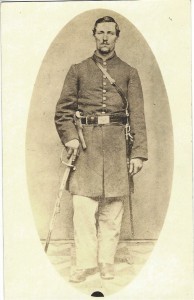
my great-great grandfather, Adoniram Judson Dickison (My brother has the sword)
I was almost afraid to look at them. I thought they might have crumbled to dust, but all but two are fairly well preserved. There are seven in all, written between January 19, 1864 and February 17, 1865 to a niece, Francis Alice Rozelle, back in Oswego, New York. Ancestry.com helpfully tells me that Alice would have been thirteen and fourteen at the time (though I haven’t yet figured out quite how they were related). A. Judson, as he is always called, repeatedly tells Alice that her handwriting is excellent and to stay in school as long as she can. Her side of the correspondence does not survive.
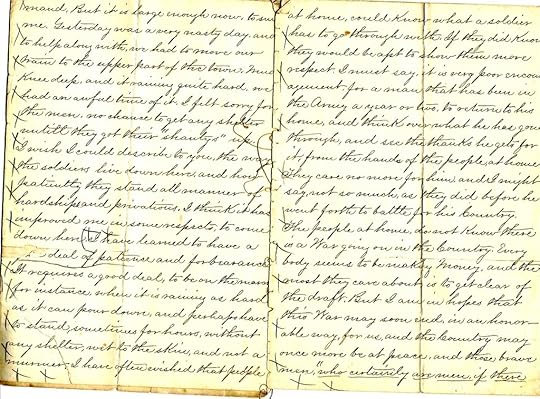 January 19th, 1864, Culpepper, VA
January 19th, 1864, Culpepper, VA
“Yesterday was a very nasty day, and to help along with, we had to move our train to the upper part of the town. Mud knee deep and raining quite hard, we had an awful time of it. I felt sorry for the men. No chance to get any shelter until they got their “shantys” up. I wish I could describe to you the way the soldiers live down here and how patiently they stand all manner of hardships and privations. I think it has improved me in some respects to come down here. I have learned to have a good deal of patience and forbearance. It requires a good deal to be on the march, for insistence, when it is raining as hard as it can pour down, and perhaps have to stand for hours without any shelter, wet to the skin, and not a murmur. I have often wished that people at home could know what a soldier has to go through with. If they did know, they would be apt to show them more respect.”
November 6th, 1864, Yellow House, VA
[The part at the top about his wife Sarah having bought a baby girl threw me for a bit of a loop, until I realized from other letters when his last leave had been. I don’t know if he is shielding a young girl from the realities of conception and birth, or if he is joking. The baby would have been my grandfather’s beloved Aunt Clara. She and her husband–childless themselves–paid for my grandfather to go to Columbia University after he came home from World War I.]
“You ask me what I think of this War. I think it is pretty near its end. We all think here in the Army that the Rebs are pretty well used up and there are very few but what think that the re-election of Lincoln will go a long way to closing up the War than anything that can be done just at present. All they are holding out now for is the hope that McClellan may be elected by which they hope to get better terms for Peace. But I think Lincoln’s re-election almost as certain as that the sun will rise to-morrow morning. How anyone who is not a traitor to their country could cast their vote for McClellan and the Chicago Platforms, I can not see.”
February 17th, 1865
“Our Campaign lasted six days, and suffice to say, we had a very nasty time of it. We got into a fight, and our Corps lost 100 killed and 900 wounded and about as many more missing and taken prisoners.”
The letters are fascinating and alternate between the harrowing (he casually mentions he has been taken prisoner “again” and has escaped “again.”) and the homely. He pines for letters from his wife, worries about money (his wife has had to borrow from relatives while he tries to sell a piece of property and waits to be paid) and writes frequently about the weather both where he is and at home in New York.
I do remember my grandfather, in his eighties, lamenting that he’d never asked his grandfather more about the Civil War. A boy of the 1890s, he was far more interested in cowboys and ranches. And here I am lamenting never talking to my father or grandfather about their service. Which goes to show something, I guess. Perhaps that people never change.
May 27, 2016
Weekend Update: May 28-29, 2016
 Next week at Maine Crime Writers there will be posts by Barb Ross (Monday), John Clark (Tuesday), Dick Cass (Wednesday), Maureen Milliken (Thursday), and Lea Wait (Friday).
Next week at Maine Crime Writers there will be posts by Barb Ross (Monday), John Clark (Tuesday), Dick Cass (Wednesday), Maureen Milliken (Thursday), and Lea Wait (Friday).
Keep your comments coming this weekend. Another bag of Maine books and goodies will go to one lucky person who reads and reacts to our May blog posts.
In the news department, here’s what’s happening with some of us who blog regularly at Maine Crime Writers:
from Kaitlyn Dunnett: I’m doing a Goodreads giveaway of ten advance reading copies of the tenth Liss MacCrimmon mystery, Kilt at the Highland Games. Here’s the link: Goodreads giveaway but you’ll have to wait until Monday, May 30, to enter. The giveaway will remain open until Friday, June 17.
from Bruce Robert Coffin: Sisters in Crime presents: Breaking into Crime Fiction, Thursday, June 2nd at 7 pm at the Public Library in Leominster, Massachusetts. I’ll be joined by literary agent Paula Munier from Talcott Notch Literary and author C. Michele Dorsey, as we discuss the road to publication. Books will be available for purchase and signing. We’d love to see you there!
from Lea Wait: Writers love libraries! Saturday, June 4, I’ll be one of the authors celebrating the 100th anniversary of the Waldoboro Library, in Waldoboro, Maine. I’ll be signing my books there from 12:30 until 3:30.
from Kate Flora: My co-writer, Roger Guay, and I will (and possibly a clever K9) will be at the Bridgton Library, 1 Church Street in Bridgton, at 2:00 on Tuesday, June 7th, to talk about A Good Man with a Dog.
from Barb Ross: Friday, June 3, 2016, 11:30 am to 3:00 pm, I’ll be speaking and signing at the Wolfeboro N.H. Friends of the Library Book and Author Luncheon at the Bald Peak Colony Club inMoultonborough, NH. Tickets must be purchased in advance.
An invitation to readers of this blog: Do you have news relating to Maine, Crime, or Writing? We’d love to hear from you. Just comment below to share.
And a reminder: If your library, school, or organization is looking for a speaker, we are often available to talk about the writing process, research, where we get our ideas, and other mysteries of the business. Contact Kate Flora: mailto: kateflora@gmail.com
May 26, 2016
Freelance Editing for Fun and/or Profit
Jen Blood here on a gorgeous May day, taking a break from the daily grind to write this. As a freelance editor, I get asked fairly frequently how I got started, and how I recommend others get their footing if they think editing is the career for them. Usually when I get that question, I grimace internally, consider the fifteen years I was virtually penniless while I learned what it actually meant to be a freelance editor, and file the email away somewhere to answer later. And then, inevitably, I forget about it.
Today, after getting another email from a would-be editor trying to figure out how to get her foot in the door, I decided I would actually try to provide a real answer.
First, though, a little about what I do.
In addition to being a writer myself, I work as a freelance copy and content editor for traditional and independently published authors, and also offer beta reading services and some marketing and publishing consultation for self-published authors. I’m paid by individual writers rather than companies, and I offer my services through my own business (Adian Editing). My focus is on plot-driven fiction because that’s what I’m most well-versed in and most passionate about, but I’ll occasionally do nonfiction if it’s a topic that grabs me or an author I’ve worked with in the past on other projects. My specialties include mystery, thriller, romantic suspense, fantasy, YA (young adult), and occasionally romance, erotica, or science fiction. Last week, I did a content edit on a spy thriller, a copy edit on a supernatural mystery, and beta read a contemporary romance. This week, I’m content editing an action/romance and copy editing a horror/zombie apocalypse thriller. Next week, I’ll be copy editing a YA dystopian thriller, beta reading an erotic short story, and content editing a YA fantasy.
So, those are my days. I work anywhere from 9 a.m. until midnight, to 9 a.m. till noon, depending on deadlines and what’s on my roster. At this point, I don’t generally need to worry about drumming up business — I’ve been doing this long enough and word of mouth is happily good enough, that I can pick and choose my clients and am typically booked for at least the next six to eight weeks. I could book farther out, but for my own sanity try to keep it limited to the next two months. I have a stellar client list of hardworking authors I love and respect, and we generally have a great back-and-forth when it comes to the writing craft, the growth and development of their characters, and what their next steps are in order to achieve their writing and publishing goals. I don’t have an assistant (though I should probably get one at this point), but I do occasionally hire subcontractors to do proofreading for me once the actual editing is done, just to have another pair of eyes on a project.
I still ultimately aspire to work full-time as a novelist, but this is a pretty great way to pay the bills in the meantime. I’ve been able to hone my own craft on the job, and I love the fact that I can choose work that I’m genuinely excited about, by writers who are serious about both the craft and the business of being authors.
So, that’s me. Now let’s get to you. How do you become an editor — working from home, making your own hours, helping authors get better at a craft you both love?
As I mentioned before, it took me fifteen years to get here. It was long and circuitous and not terribly profitable during that time, but I’ll be the first to admit that my methods were hardly the most efficient. Here’s what I recommend instead.
If you’re truly just getting started, and have no college degree (or no college degree related to the field in which you hope to work), consider taking a certificate course online through a reputable college or organization. I took one in 2014 that was actually quite helpful, though for the life of me I can’t remember what the website was. I will say up front, however, that having undergraduate and graduate degrees in Creative Writing has made a big difference in the amount I’m able to charge and the way clients receive my feedback — not to mention the fact that so many of the skills I use on the job were honed in school.
Volunteer or get an internship. You don’t have to be nineteen to work for free — regardless of your station in life, if you have no practical experience as an editor, check in with your local newspaper or contact a professional editor, to find out if they have any openings for interns hoping to learn the business.
Hone your communication and customer service skills. Freelance editing, particularly the kind where you’re working directly with the author, is not just about understanding what makes a novel work. It’s about being able to communicate that clearly to your client in a way that conveys what needs to be changed without making them quit writing and go jump off a cliff. Writers are sensitive sorts, so this isn’t as easy as you might think. I use a lot of humor, am liberal with my praise for anything that even remotely works in a manuscript, and then I pull no punches. Because, ultimately, you’re getting paid to be a critic, not a Mom.
If you already have a college degree in English or Writing or some related field, and you have hands-on, demonstrable experience as an editor, here’s what I recommend.
(1) Specialize.
As an undergrad, I printed brochures offering my services as an editor. And a copywriter. And a graphic designer. And an office cleaner. And your BFF who’ll pick up coffee and write nice cards to you when you’re feeling blue. Okay, the last one wasn’t on there, but it was definitely implied. I went to a copywriter with an advertising firm in Portland and gave him the brochure. His response? “I don’t know what you do.” I pointed at the brochure. “I do anything — whatever you need.”
Wrong answer. If you’re doing everything, you’re not doing anything all that well. Figure out what you love and what you’re good at (hopefully, these are not mutually exclusive), and focus on that. If you love nonfiction, trust me — there are writers out there desperate for a good editor. Memoir, children’s books, science fiction, Christian fiction, mysteries penned by cats… Right now, you can’t swing one of those mystery-writing cats — dead or alive — without hitting an author or would-be author. They all need a good editor. Don’t be afraid to hone in on that.
(2) Charge the Going Rate…and then some.
I started out offering my editing at rock-bottom prices because there were so many other editors out there offering their services at rock-bottom prices. The thing is, a lot of those editors had no experience and were terrible at their jobs — in fact, a fair number of the work I get now is re-editing the books they edited poorly the first time around. I did some market research, honestly evaluated how much time it took me to edit a manuscript from beginning to end, and considered how much I wanted to earn, and then I increased my prices. A lot. People pay for quality; if they see rock-bottom prices, they assume you can’t charge more because you’re not worth more. Charge what you’re worth, and stand by that.
(3) Know Where to Go for Work.
I got a lucky break just when my business was starting to really take off, when Joanna Penn — author of the award-winning blog and podcast The Creative Penn — was looking for a new editor and asked if I would do a sample edit. I already knew Joanna from a couple of interviews I’d done with her for my own blog and a guest post I’d written for hers, so the request didn’t come out of the blue. Still, I jumped at the chance, and it paid off. If you know authors who have a good following, ask them if they need an editor. If you’re reading a book by an author you think could be edited better, write to them. Nicely.
Dear Jane Doe, I love your writing style and your mysteries invariably keep me up all night. I noticed on the last couple of books you’ve written, however, that there were some editing errors that detracted a bit from your narrative. I hope you don’t find it too forward of me, but if you would like a complimentary edit of your first chapter to get an idea of my expertise, I’d love the opportunity to work with you.
Be polite, but confident. Don’t talk about how you’re just getting started and are hoping to get a break in this cruel world — sometimes that works, but too often it comes off as groveling.
(4) Be professional.
Have a website. Make sure the writing is clear and concise, and there are no misspellings or grammatical errors. Have a contract. It doesn’t have to be lengthy, but it should cover the bases and clearly define things like price, deadlines, and what you’re promising the client. I also have a standard questionnaire I send out to prospective clients, which gives me an opportunity to learn a little more about who they are and what they’re hoping to achieve with their writing. Be courteous when responding to email inquiries, even if the person is writing from the Seventh Circle of Hell and wants you to edit a memoir about his tormented inner child – for free.
I know a lot of these seem like no-brainers, but it never hurts to mention them. And finally…
(5) Hone Your Craft.
Editing is hard work. It takes concentration, long hours, and an inherent understanding of how quality writing works. Read — a lot. Study great novels. Study terrible novels. Check out websites like Grammar Girl and Grammarly to get the skinny on the latest editorial debates. Network with writers and other editors. Take classes when they’re available. Teach classes when you have the opportunity. Become an expert.
So… That’s my advice for folks out there who’ve been dreaming of making a change and living a life devoted to the written word. I hope this is helpful. Best of luck!
Jen Blood is author of the bestselling Erin Solomon Mysteries, and owner of Adian Editing, providing expert editing of plot-driven fiction for independent and traditionally published authors around the world. For your free Editing A to Z Cheat Sheet, visit http://adianediting.com/.
May 25, 2016
The Part of Writing I have The Most Trouble With

My Book Box
My most recent novel, THE BLACK ORCHID, was released in mid-March and received a favorable review from Publisher’s Weekly: : “…Hardacker keeps the action flowing all the way to the violent climax.” I was also pleased to learn that My Book Box had selected it to be included in their April box (if you aren’t familiar with them check out: http://www.mybookbox.com). They are an up-and-coming book club. Each month they send a book box containing 2 books are included (one from each of the subscriber’s selected genres). Most often the children’s books will be hardcover and adult books will be paperback. They are always new releases in the U.S. within the past 45 days. Do not expect to receive the latest New York Times Bestseller, but do expect an amazing read from a talented author. Each box will also include something special, usually some sort of token such as a book mark or even just a letter from one or both authors, and when available, exclusive content for the included book!
So, you’re probably asking “What’s to hate?” For me the answer is easy PROMOTION!!! I have never been an out-going person (as a matter of fact I kind of envied the North Pond Hermit–not the fact that he was a prolific burglar but the way he avoided encountering a member of the human race for twenty-seven years). My late wife was cut from the same mold. When we lived in New Hampshire a major winter storm hit the Nashua area where we lived. She and I nestled into our warm home and didn’t come out for three days (we only popped out then because a concerned neighbor knocked on our door to see if we were still alive…) completely content to ignore Mother Nature and her cruel sense of humor. However, I must clarify this somewhat: I am not afraid to do public appearances; in fact the opposite is true. I gladly agree to appear at any author event that is offered… There is the key the phrase: that is offered…
What I have a difficult time with is finding the venues. Living up here in the county doesn’t help either. The closest book store of any size is in Bangor, a three and a half hour drive) and attendance at the appearances I’ve done at local libraries has usually been two: me and the librarian. I have come to finally realize that people go to libraries to borrow books; not to buy books! There was one pleasant surprise however, last September I appeared at the Curtis Memorial Library in Brunswick and spoke to an audience of more than fifty readers. Even more surprising was that from their questions, it was evident that many of them had read my books!
The most success I’ve had in booking appearances (and I don’t mind traveling anywhere in the northeast) has come from our own Kate Flora. Kate knows me for the introvert I am and when we attended the 2015 Maine Literary Awards last year took me by the hand and introduced me to several other people there. She has also aided me in getting a number of appearances–the Curtis Library among them (terrific venue! Over fifty people in attendance and it was a great evening.
When THE BLACK ORCHID was released I made up my mind that I was going to aggressively promote the book and determined to construct a campaign that included a number of steps:
I setup a Goodreads giveaway of five autographed copies of the book 1204 readers have requested it; another 643 readers added it to their “to Read” list. A word off caution here: If you have not done a Goodreads Giveaway and elect to do so, Be careful how you set it up. They offer a number of options one of which is what country(ies) would you like to run it. I wanted to do it in the US only (you are responsible for mailing the books to the winners) but hit the wrong selection and included Canada and the UK. Three of my five winners were from outside the US–two from Canada and one from Great Britain–the postage came to $60.00! Still cheap if you figure that if 1204 people registered to win that comes out to about five cents per registration, pretty cheap exposure. Still it was a bit of a shock when I saw the postal charges. Thank god all five weren’t in Great Britain. FYI, outside the US there is no media mail and you have to pay regular mail rates in my case $22.50 to Great Britain and $15.50 to both Nova Scotia and Ontario.
I have emailed each of the major bookstores serving Maine and many of the indies. I have yet to hear from Books-a-Million or Barnes and Nobles. I was contacted by Sherman books who informed me that they were in the middle of inventory and for me to please get back to her in June. I am finding that BAM and B&N are pretty much an exercise in futility (if any of you has had success in booking an appearance at one or the other, please get in touch with me and tell me the secret).
I have booked several local venues to wit: commencing on June 2 Caribou will be starting their bi-weekly Thursdays on Sweden event (I blogged about it last summer) and on Wednesdays they will be having a weekly Farmer/Craft Market (No admission fee for either of these events. You do have to register for ToS–I have a table reserved for each Thursday so if you’re up this way touch bases with me I’ll gladly slide over and let you have a seat at my table (FYI last summer I sold over $500.00 of my books–I was one of three vendors selling books.)
The above schedule still leaves a lot of gaps on my calendar… If you should find yourself in need of someone to appear either with or for you, contact me. I decided to print up some business cards…they will read: HAVE BOOKS: WILL TRAVEL…
May 24, 2016
I Didn’t Know I Was Allowed . . .
Kate Flora: Last week my husband and I were sitting with some good old friends in
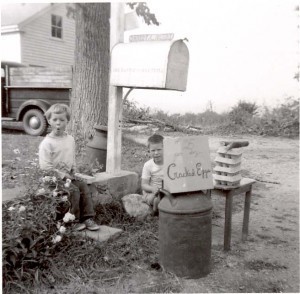
I knew things weren’t what they were cracked up to be at a very young age.
Oxford, England, talking about the length of our friendship, and what we were doing now, the usual catching up people do. I had brought them a copy of And Grant You Peace and our hostess asked me if I’d always wanted to be a writer.
It’s a pretty common question to ask an author. It comes up all the time during book talks at libraries and bookstores. I think my usual answer probably is something along the lines of “all my life” and then I move on. But the question made me reflect on what the real answer was. I was always enchanted by books and what authors can do. Certainly, like many another, I was writing from a very young age. Middle school was a particularly fertile time, when my friend Pammie and I wrote plays and epic poems. In high school and after, I wrote a joint novel with my oldest friend Karin, the two of us sending chapters back and forth. Later, I did the same thing with a housemate from college.
But despite all that, and despite the fact that my mother was a writer, the answer I gave to my hostess’s question, one that surprised me, perhaps, as much as it did her, was that when I was growing up, I didn’t actually believe I was allowed to become a writer. To write, perhaps, but not to be allowed to call myself a writer. I might have dreamed about it. I might have longed to have that special, magic talent that would let me take people into a world I’d imagined and hold them there, but it seemed beyond the scope of the life I was living on a farm in rural Maine to imagine that I would actually be allowed to call myself a writer. It seemed too proud. Arrogant, even. And I truly believed that writers were people with a special gift, anointed somehow to engage in their chosen craft, while I was just a dreamy farmer’s daughter.
One of the things that made it seem more like an impossible dream than a reality was that
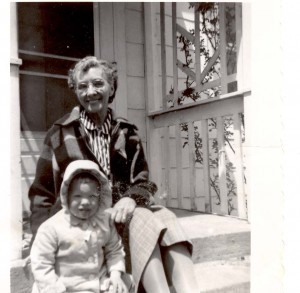
A famous Maine author with her paternal grandmother
I knew I would have to make a living. My childhood was a constant series of financial crises. Agriculture of any sort is a fickle business, and as the price of eggs rose and fell, it seemed we were always in danger of losing the farm. My siblings and I would huddle in a dark, safe place at the top of the cellar stairs when the bill collectors came to the door. Being safe from a life like that meant going to college and choosing a career that would give me a more reliable income.
I dutifully went to college. Then, after discovering that my degree in English, which I had believed was the magic ticket to a career, qualified me for little, I went to law school. During those years of school and starting to practice law, I was too busy to do much more than dream about writing, or dip my toe in in the form of the occasional writing class. But in one of those occasional writing classes, one that either met in a damp church basement in Wellesley, Massachusetts, or at night in a classroom at Brandeis, I was anointed. It came in the form of an offhand comment from the instructor, Arthur Edelstein, along the lines of “Don’t let them tell you otherwise. You ARE a writer.”
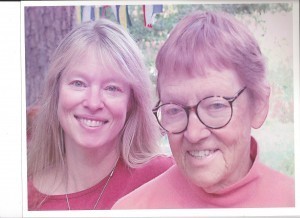
Me and my mom
It was several more years before I was able to wrap the mantle of that permission around me and sit down to give writing a serious try. For some of us, it seems, we have to reach a point where the passion for trying outweighs the fear of failing. And so, when my second son was born, I thought I’ve always wanted to write, and maybe it is something I can do around the busy lives of two small boys. They never slept. They were never still, and yet somehow, a year later, I typed “The End” at the bottom of my first novel. It went into a drawer and was followed by two more, and ten long years in the unpublished writer’s corner, before I published my first book. Claiming to be a writer still cowed me so much that I think I had sold my fifth book before I started putting “Writer” in the line that asked for occupation.
And in gratitude to the great man who took the time to anoint me, I now tell my students two important things. First, that if you want to be a published writer, you’ll need the hide of an alligator, because our world is full of rejection. But second, and more important, although most of the world will try to convince you that you’re not, rejection will outweigh praise, and you have to be your own cheerleader, you are allowed. Only YOU get to decide that you’re a writer.
Lea Wait's Blog
- Lea Wait's profile
- 509 followers


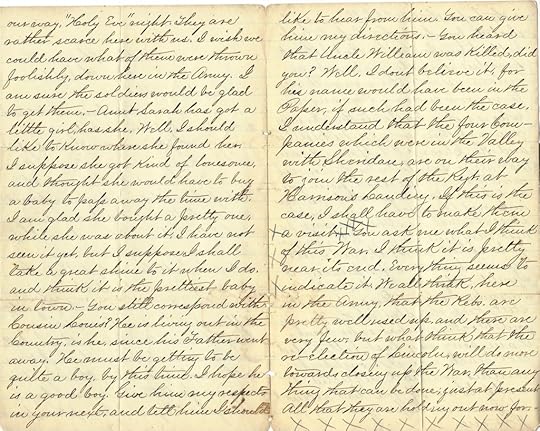


![infographics_10076131-1115-allint-1 [Converted]](https://i.gr-assets.com/images/S/compressed.photo.goodreads.com/hostedimages/1464362408i/19231988.jpg)

